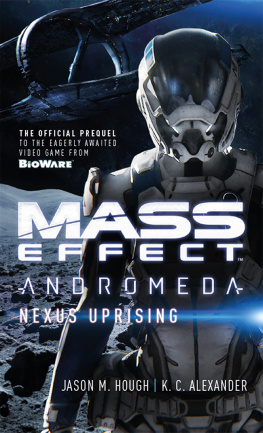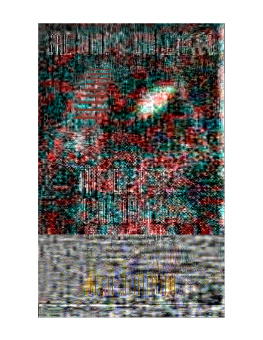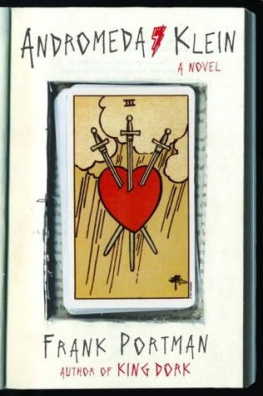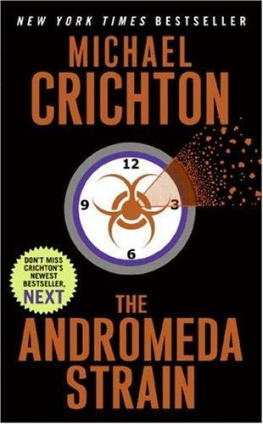Fred Hoyle & John Elliot
A for Andromeda
A novel of tomorrow
Light was soaking out of the sky when they drove up to Bouldershaw Fell. Judy sat beside Professor Reinhart in the back of the staff car as it slid up the road from Bouldershaw town to the open moor; she peered hopefully out of the windows, but they were nearly at the crest of the hill before they could see the radio-telescope.
Suddenly it stood in front of them: three huge pillars curving together at the top to form a triangular arch, dark and stark against the ebbing sky. Hollowed out of the ground between the uprights lay a concrete bowl the size of a sports arena, and above, suspended from the top of the arch, a smaller metal bowl looked downwards and pointed a long antenna at the ground. The size of the whole thing did not strike the eye at first; it simply looked out of proportion to the landscape. Only when the car had drawn up and parked beneath it did Judy begin to realise how big it was. It was quite unlike anything else she had seenas completely and intensely itself as a piece of sculpture.
Yet, for all its strangeness, there was nothing particularly sinister about the tall, looming structure to warn them of the extraordinary and disastrous future that was to emerge from it.
Out of the car, they stood for a moment with the soft, sweet air filling their heads and lungs, and gazed up at the three huge pylons, at the metal reflector that glistened high above them, and at the pale sky beyond. Around them a few low buildings and smaller arrays of aerials were scattered about on the empty moor-top, enclosed by a wire-link fence. There was no sound but the wind in the pylons and the curlews calling, and they could almost feel the great concrete-and-metal ear beside them straining to listen to the stars.
Then the Professor led the way to the main buildinga low stone-faced affair with a half-finished entrance and a newly-laid approach. Men were putting in gateposts and direction notices and painting them: it all looked very new and sharp against the soft, dark hilltop.
Theres all sorts of subsidiary gubbins, said the Professor, with a small delicate wave of his hand. This houses the main control room.
He was a man in his sixties, small, neat and cosy, like a family doctor.
Its quite a baby, said Judy.
Baby? Its the biggest baby Ive ever given birth to. A ten years labour.
He twinkled at her and his small black shoes pattered up the steps into the control building.
The entrance hall had an unfinished but at the same time familiar look: inevitable pegboard ceiling, inevitable composition floor, plain colour-washed brick walls and fluorescent lighting. There was a wall telephone and a drinking fountain; there were two small doors in the side walls, and there were double doors facing the entrance; and that was about all. A faint hissing noise came from behind the double doors. When the Professor opened them the hissing became louder. It sounded like atmospherics from a radio.
As they went through the double doors a man in a cleaners brown coat came out. His eye met Judys for a moment, but when she parted her lips he looked away.
Good-evening, Harries, said the Professor.
The room they entered was the control room, the centre of the observatory. At the far end an observation window gave a view of the gigantic sculpture outside, and facing the window was a massive metal desk, like an organ console, fitted with panels of buttons, lights and switches. Several young men were working at the desk, referring from time to time to the two computers which stood in tall metal cases on each side of it. One side wall was covered with enlargements of optical-telescope photographs of stars, and the other was two-thirds glass partition behind which more young men could be seen working at equipment in an inner room.
The opening ceremony will be in here, said Reinhart.
Where does the Minister break the champagne bottle, or cut the ribbon, or whatever he does?
At the desk. He presses a button on the control desk to start it.
It isnt working yet?
Not yet. Were running acceptance tests.
Judy stood by the doorway taking it in. She was the sort of good-looking young woman who is more often called handsome than pretty, with a fresh complexion, an alert, intelligent face and a very positive, slightly ungainly, way of standing. She might have been a nurse, or an officer in the Services, or simply the product of a good hockey-playing school. She had rather large hands and deep blue eyes. Under one arm she held a bundle of papers and pamphlets which she pulled out and looked at, as if they might explain what she saw.
Its the biggest radio-telescope, wellanywhere. The Professor smiled happily round the room. Its not as big as an interferometer, of course, but you can steer it. You can shift your focus by the small reflector up top, and by that means you can track a source across the sky.
I gathered from these, Judy tapped her papers, that there are other radio-telescopes operating in the same way.
There are. There were in nineteen-sixty, when we started thisand thats several years ago. But they havent our sensitivity.
Because this is bigger?
Not entirely. Also because weve better receiving equipment. That should give us a higher signal-to-noise ratio. Its all housed in there.
He pointed a small, delicate finger to the room behind the glass panel.
You see, all you pick up from most astronomical sourcesradio stars for instanceis a very faint electrical signal, and its mixed up with all kinds of noise, from the atmosphere, from interstellar gas, from heaven knows whatwell, heaven indeed.
He spoke in a precise, matter-of-fact tenor voice; he might have been a doctor discussing a cold. The sense of achievement, of imagination, was all hidden.
You can hear sources other people cant? asked Judy.
Hope to. Thats the idea. But dont ask me how. Theres a team evolved it. He looked modestly down at his little feet. Doctors Fleming and Bridger.
Bridger? Judy looked up sharply.
Flemings the real brains. John Fleming. He called politely across the room. John!
One of the young men detached himself from the group at the control desk and wandered towards them.
He said, Hi! to the Professor and ignored Judy.
If you have a moment, John. Dr. Fleming. Miss Adamson.
The young man glanced at Judy, then called across to the control desk.
Turn that flaming noise down!
What is it? Judy asked.
The atmospherics reduced themselves to a faint hissing.
The young man shrugged.
Interstellar hiss, mainly. The universe is full of electrically charged matter. What we pick up is an electrical emission from these charges, which we get as noise.
The background music of the universe, Reinhart added.
You can keep that, Prof., said the young man, with a sort of friendly contempt. Keep it for Jackos press handouts.
Jackos not coming back.
Fleming looked faintly surprised, and Judy frowned as if she had mislaid some piece of information.
Who? she asked the Professor.
Jackson, your predecessor. He turned to Fleming. Miss Adamsons our new press officer.
Fleming regarded her without relish. Well, they come and go, dont they? Inheriting Jackos spheres?
What are they?
Dear young lady, youll soon find out.
Im showing her the layout for Thursday, the Professor said. The official opening. Shell be looking after the press.
Fleming had a dark, thoughtful face which was less surly than preoccupied; but he seemed tired and bitter. He grumbled away in a thick Midland accent.
Oh yesthe Official Opening! All the coloured lights will be working. The stars will sing Rule Britannia in heavenly chorus, and Ill be round at the pub.


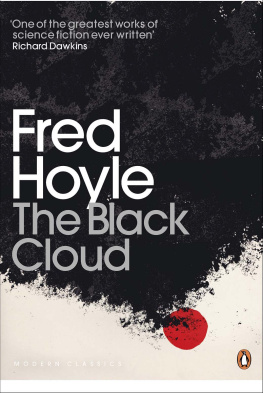
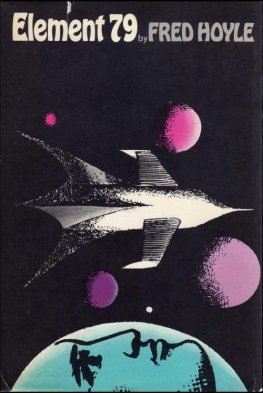

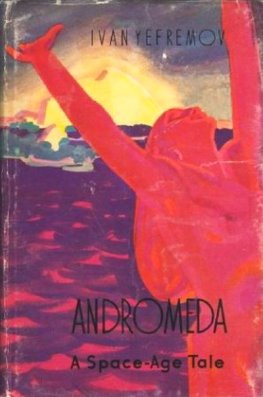

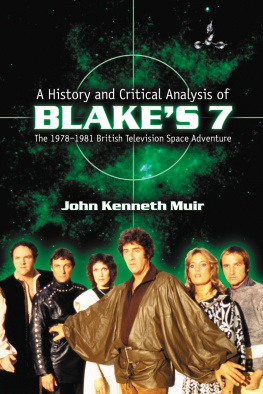
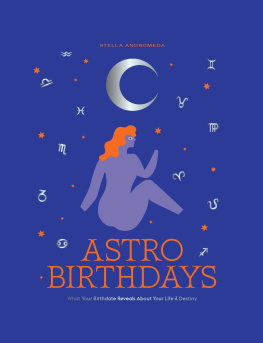
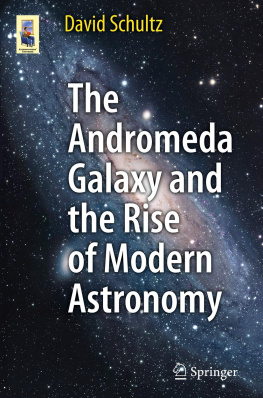
![Wendelle C. Stevens - UFO Contact from Andromeda: Extraterrestrial Prophecy [face to face]](/uploads/posts/book/133614/thumbs/wendelle-c-stevens-ufo-contact-from-andromeda.jpg)
